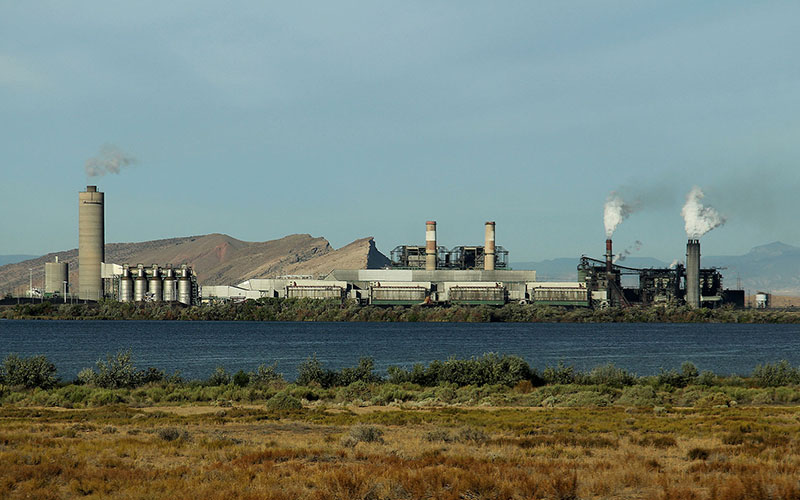
The Four Corners Power Plant will get a $160 million pollution-control upgrade as part of a settlement of a lawsuit over emissions at the plant. (Photo courtesy Tony Bennett/APS)
WASHINGTON – Utility companies in Arizona and New Mexico will spend up to $160 million on new technology to cut harmful emissions from the Four Corners Power Plant, under a consent decree announced by the federal government Wednesday.
The deal also requires that Arizona Public Service and other owners of the coal-fired power plant set aside $6.7 million for health and environmental programs on the Navajo Nation, where the plant is located, and pay a $1.5 million civil penalty.
The agreement settles a 2011 lawsuit by tribal and environmental groups who charged that the plant was in violation of the Clean Air Act.
Representatives with APS did not immediately return calls seeking comment Wednesday.
But in the consent decree, the plant’s owners denied the charges in the suit and “maintain that they have been and remain in compliance with the act” and are not liable for civil penalties. They agreed to settle to “avoid the costs and uncertainties of litigation and to improve the environment,” the settlement says.
Critics of the plant hailed the agreement Wednesday.
“Pollution from Four Corners has sickened local communities for decades despite plenty of opportunities for the plant to clean up its act,” said Nicole Horseherder, a spokeswoman for To’ Nizhoni Ani.
It was one of three groups that filed the 2011 suit, along with Dine Citizens Against Ruining our Environment (CARE) and the National Parks Conservation Association.
Kevin Dahl, Arizona senior program manager with NPCA, called the settlement a shift toward a cleaner and a more just future for people and parks of the Southwest.
“Clearer skies over parks like Mesa Verde and Petrified Forest are good news for visitors, nearby communities and the local economy,” Dahl said.
APS is the primary owner and operator of the Four Corners plant, which federal officials called one of the largest sources of pollution in the country. Partial owners include Salt River Project and Tucson Electric Power, among others.
The technology upgrades called for in the settlement will remove an estimated 5,540 tons of sulfur dioxide and nitrogen oxide emissions from the plant annually, according to information from the Department of Justice and the Environmental Protection Agency, which represented the government in the deal.
The companies will also create a $6.7 million mitigation fund to go toward cleaner heating systems and weatherization projects for homes on the Navajo Nation, as well as a health care trust fund. That $2 million health fund will be used to pay medical expenses of people with respiratory problems on the Navajo Nation.
“The agreement will require stringent pollution controls as well as public health and environmental projects that will have lasting benefits for the Navajo people,” said Assistant Attorney General John C. Cruden, in a prepared statement on the deal.
“It is also a reflection of how serious we are about addressing environmental justice issues in Indian country,” said Cruden, of the Justice Department’s Environment and Natural Resources Division.
Dine CARE board member Lori Goodman said corrective action is long overdue.
“For far too long, the irresponsible management of Four Corners has denied the Navajo people the basic human right to clean, healthy air in our communities,” Goodman said.
Cynthia Giles, assistant administrator for EPA’s Office of Enforcement and Compliance Assurance, said in a statement that the law requires plant operators to protect the air for those who live nearby.
“All power plants should be using the latest air pollution control technology,” Giles said.
The deal still has to be approved by the courts, after a 30-day public comment period. But environmental groups were already celebrating Wednesday.
“This legal victory represents a relentless and inspired fight led by members of the Navajo Nation and concerned local leaders, who refused to give up on the health of their community,” said Mary Whittle, an attorney for Earthjustice.